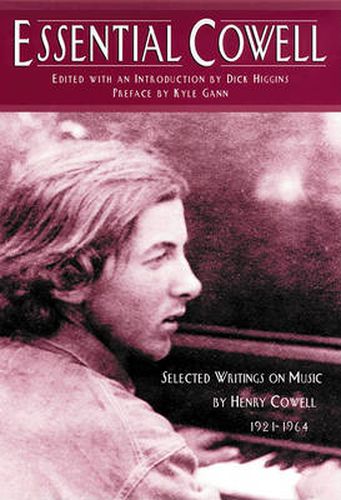Readings Newsletter
Become a Readings Member to make your shopping experience even easier.
Sign in or sign up for free!
You’re not far away from qualifying for FREE standard shipping within Australia
You’ve qualified for FREE standard shipping within Australia
The cart is loading…






Henry Cowell (1897-1965) was perhaps the first genuine World Music composer, incorporating themes and modalities of other ethnic traditions into his own unique and influential repertoire. Of even greater importance, he was almost certainly the first World Music critic, devoting much of his professional life to investigating musical traditions around the globe and educating new generations of composers and audiences. Through his journal, New Music Quarterly, his concert promotions, and his popular WBAI (New York) radio broadcasts, he explored the possibilities of music, from the groundbreaking works of Charles Ives, Carl Ruggles, and Edgar Var?se, to the original blues of Leadbelly, to the Indonesian gamelan and beyond. A revolutionary thinker, his influence was intense and immediate. Among his students may be counted an impressive group of influential mid-20th century composers-including John Cage, Lou Harrison, Burt Bacharach, and even George Gershwin-all of whom in one way or another helped to carry on the movement established by Cowell. In his preface, Kyle Gann notes that Cowell’s criticism is more relevant today than it has ever been before, but also notes that there has been remarkably little attempt so far to assess Cowell as a writer and theorist. This volume of selected writings by Henry Cowell-the first ever to be published- offers insight into the theories of this musical thinker. It includes portions of his legendary unpublished book, The Nature of Melody, as well as essays on Stravinsky, Thomson, Partch, Antheil, Bart?k, Var?se, Cage, Charles Seeger; articles a variety of folk musical traditions, music for dance and film, the use of music as propaganda; a discussion about creative notation; and a study of the nature of noise. Following Professor Gann’s preface there is an introductory essay by the editor, the late Dick Higgins, which offers context and background information.
$9.00 standard shipping within Australia
FREE standard shipping within Australia for orders over $100.00
Express & International shipping calculated at checkout
Henry Cowell (1897-1965) was perhaps the first genuine World Music composer, incorporating themes and modalities of other ethnic traditions into his own unique and influential repertoire. Of even greater importance, he was almost certainly the first World Music critic, devoting much of his professional life to investigating musical traditions around the globe and educating new generations of composers and audiences. Through his journal, New Music Quarterly, his concert promotions, and his popular WBAI (New York) radio broadcasts, he explored the possibilities of music, from the groundbreaking works of Charles Ives, Carl Ruggles, and Edgar Var?se, to the original blues of Leadbelly, to the Indonesian gamelan and beyond. A revolutionary thinker, his influence was intense and immediate. Among his students may be counted an impressive group of influential mid-20th century composers-including John Cage, Lou Harrison, Burt Bacharach, and even George Gershwin-all of whom in one way or another helped to carry on the movement established by Cowell. In his preface, Kyle Gann notes that Cowell’s criticism is more relevant today than it has ever been before, but also notes that there has been remarkably little attempt so far to assess Cowell as a writer and theorist. This volume of selected writings by Henry Cowell-the first ever to be published- offers insight into the theories of this musical thinker. It includes portions of his legendary unpublished book, The Nature of Melody, as well as essays on Stravinsky, Thomson, Partch, Antheil, Bart?k, Var?se, Cage, Charles Seeger; articles a variety of folk musical traditions, music for dance and film, the use of music as propaganda; a discussion about creative notation; and a study of the nature of noise. Following Professor Gann’s preface there is an introductory essay by the editor, the late Dick Higgins, which offers context and background information.